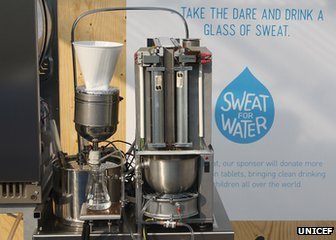在瑞典,一部能夠從浸滿汗水的衣服上提取出安全純凈飲用水的汗水提取機進入了人們的視線。這部機器通過高速旋轉和加熱待提取的衣服,從而使汗水變成蒸汽與衣物分離,再經過一層特殊設計的過濾網,讓水分子得以通過,而細菌、衣物纖維等物質被隔離開來,如此就提取到了據稱比當地自來水還要清潔的飲用水。這部機器為聯合國兒童基金會設計,旨在讓人們認識到世界上還有7.8億人口仍然面臨干凈飲用水短缺的問題。該機器亮相以來,已有超過一千位哥德堡市民喝過“別人的汗水”。
汗水提取機的設計者表示,該機器的原理類似于國際太空站的尿液凈化循環系統,但造價卻低廉很多。不過,該項設計的局限在于,產出的水量太少。正常情況下從一件汗濕的T恤上所提取出的汗水只夠轉化成10毫升飲用水,僅夠“喝一口”。此次活動組織方負責人表示,汗水的供應量永遠都跟不上人們對飲用水的需求量,解決飲用水短缺的問題可能有別的更好的辦法,比如水凈化藥劑。

 |
|
The sweat-extraction machine was developed to promote a campaign by Unicef in Sweden |
A machine that takes sweat-laden clothes and turns the moisture into drinking water is in use in Sweden.
The device spins and heats the material to remove the sweat, and then passes the vapour through a special membrane designed to only let water molecules get through.
Since its Monday launch, its creators say more than 1,000 people have "drunk other's sweat" in Gothenburg.
They add the liquid is cleaner than local tap water.
The device was built for the United Nation's child-focused charity Unicef to promote a campaign highlighting the fact that 780 million people in the world lack access to clean water.
The machine was designed and built by engineer Andreas Hammar, known locally for his appearances on TV tech show Mekatronik.
He said the critical part of the sweat machine was a new water purification component developed by a company named HVR in collaboration with Sweden's Royal Institute of Technology.
"It uses a technique called membrane distillation," he told the BBC.
"We use a substance that's a bit like Gortex that only lets steam through but keeps bacteria, salts, clothing fibres and other substances out.
"They have something similar on the International Space Station to treat astronaut's urine - but our machine was cheaper to build.
Volunteers have been sampling the treated sweat since the start of the week in Gothenburg
"The amount of water it produces depends on how sweaty the person is - but one person's T-shirt typically produces 10ml [0.3oz], roughly a mouthful."
The kit has been put on show at theGothia Cup - the world's largest international youth football tournament.
MattiasRonge, chief executive of Stockholm-based advertising agency Deportivo - which organised the stunt - said the machine had helped raise awareness for Unicef, but in reality had its limitations.
"People haven't produced as much sweat as we hoped - right now the weather in Gothenburg is lousy," he said.
"So we've installed exercise bikes alongside the machine and volunteers are cycling like crazy.
"Even so, the demand for sweat is greater than the supply. And the machine will never be mass produced - there are better solutions out there such as water purifying pills."
(Source: BBC News)
相關閱讀

(中國日報網英語點津 實習生 馬國佳, 編輯 Helen)